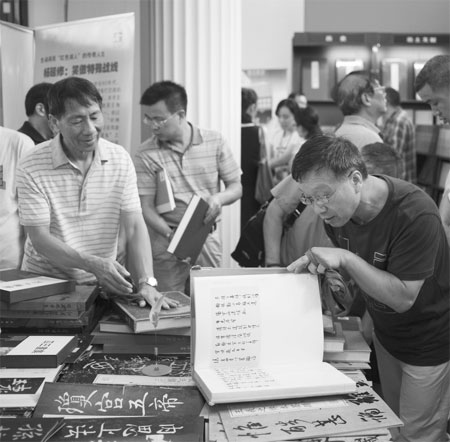Despite the digital age, Shanghai Book Fair continues to thrive
"Shanghai Book Fair (SBF) makes Shanghai the most beautiful city in China every August for the sake of reading," said Mo Yan, the Chinese Nobel literature laureate and a frequenter of the largest Chinese-language book fair since its launch in 2004.
When SBF began it was only a purchasing meeting on books published in Shanghai for buyers from the other parts of China. SBF and the book fairs in Hong Kong and Taipei are regarded as the top three Chinese book fairs today.
In 2011, the SBF started inviting famous foreign writers to meet their Chinese readers, making it one of the most popular cultural events in the city.
From Aug 13 to Aug 19, the SBF, organized by Shanghai government, hosted more than 700 activities for about 200,000 readers, 500 publishers and 1,000 writers in the 23,000 square-meter Shanghai Exhibition Center. The value of retails in the main exhibition site hit nearly 60 million yuan (US$9.77 million) in one week.
Themed "I like reading, and I like life", SBF not only creates the atmosphere of reading, but also shows Shanghai's charms as a cultural center of China. The spacious exhibition center is divided into different halls for respective publishing houses from different parts of China.
Although digital reading and publishing has increasingly become a trend for readers and publishers, books remain popular, especially among the senior and junior citizens, who prefer holding a paper-printed book rather than a digital gadget connected to a database in the cloud.
Because the event comes during students' summer vacation, children become the main visitors - often with their grandparents in the book fair. Scientific popularization, literature classics, history, sociology, Chinese studies and politics are popular subjects at the book fair.
One main theme of SBF this year is to promote socialist value outlook. A book tower piled by dozens of books on this topic stands in the entrance of the exhibit with a table lamp sitting on its top.
The first book under the table lamp is Xi Jinping's bookNew Thoughts while Working in Zhejiang (orZhijiang Xinyuin Chinese). It is a collection of his 200 short essays published in the Zhejiang Daily from 2003 to 2007 when he worked as Party chief of the province. It became a best seller this year.
"Xi's book can let me get a glimpse into his thoughts on many small problems before he became a state leader. I think reading his book can let me know how his regime will influence our life," said a reader in his 60s with the book in his hands.
To some analysts' surprise, books from Karl Marx, Immanuel Kant, Friedrich Hegel, Confucius and many other philosophers are more popular than before.
"I just want to find answers to some problems with China today from the philosophy that is closely linked to China's development," said a college student from Fudan University at the book fair.
Reading became a national fashion in China after the "cultural revolution" (1966-76) ended. People regarded books as valuable "spiritual foods" that could lead them to better life in the 1980s. There were always long queues out of the gate of a bookstore when a new book was published. Talking about existentialism was the fastest way to tell one's date they were "progressive".
The reform and open-up of the country in the 1990s gradually changed people's attitudes to books and knowledge. Money talked. A scientist's income was even lower than a vendor selling boiled eggs on the roadside.
The popularity of books in the previous decade fostered large numbers of pirated books. The quality of books dropped remarkably compared with the 1980s.
After the Internet spread in China in the 21stCentury, news portals, blogs, online forums and social media become the people's main information source. Few question the difference between information and knowledge.
Bookstores began to close. One Chinese read about four books a year on average, much lower than the 65 in Israel, Russia's 55 and Japan's 20.
The content of the books is another concern for Chinese readers. The ancient classics, foreign books translated before the 1990s and some make-a-fortune books constitute the book lists for many Chinese. In contrast, modern Chinese writers, scholars and translators contribute much less to Chinese reading than expected.
Many college students find it hard to pick out good books from their libraries. More and more educated Chinese turn to reading English books, which are often of a higher quality than Chinese books.
Foreign publishers cannot operate independently in China today. Most of them access the Chinese market through cooperating with Chinese publishing houses.
|
Book lovers inspect the offerings at the 2014 Shanghai Book Fair. Li Yang / China Daily |

























